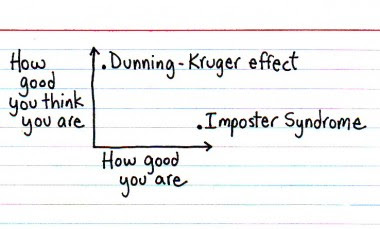
Is the need to be perfect (or perform perfectly) the most polished way of showing (or disguising) solicitude, insecurity or the impostor syndrome?
The topic always reminds me one of my favourite movies of all time and the winning Oscar laureate Natalie Portman for her work on Black Swan.
Perfectionism involves a certain amount of both:
- High standards of performance (Perfectionist Strivings = associated with positive motivation, effort and satisfaction);
- Worry, frustration and disappointment over mistakes and falling short from our goals (Perfectionist Concerns = associated with negative stress, anxiety and depression).
Four combinations of personality traits are then possible:
1 – Healthy Perfectionism
- Combines high strivings with low concerns.
- Self-confidence prevails over anxiety.
2 – Non-Perfectionism
- Combines both low strivings and concerns.
- Expectations of success are low and there’s little care for results.
3 – Unhealthy Perfectionism
- Combines both high strivings and concerns.
- Higher standards of excellence are undermined by feelings of inadequacy.
4 – Evaluative Perfectionism
- Combines low strivings with high concerns.
- Focus on avoiding mistakes, fear of failure and experience anxiety.
The following question is how to take our character feats and use them the proper way. Engaging in a champions mind-set where overwhelming concerns does not injure boosted confidence in strivings seems to be the way.
In order to do so one should start by thinking less about “Perfection” per se and focus more on excellence and challenging towards self-improvement.
More importantly, one must ask about where do those high standards come from. Is it professional pride, dignity or honor? Is it the need for love and acceptance? Is it fear of losing a job or not being able to financially support a family? Is it the fame and glory? Is it the women? Is it the fans? Is it the prestige and worship? Is it pure joy? Is it the challenge? Is it a righteous self-consciousness? What are you trying to prove, to whom and why?
Bottom line is: know how to pick a worthy cause and shoot for the stars. After all, the definition of success lies in you.
Personally speaking, and over the last years, I’ve been looking at the definition of success as the final goal, the finish line, the product and the results achieved when all is set and done. Success allowed me to say: “Here is what I have to offer”.
But more recently I’ve been changing that goal-oriented perspective to a different approach. I find myself, nowadays, in bigger and better appreciation for the path towards mastery. It’s more about the road and walking the path, rather then reaching there.
Truth be told, when I look back at what I’ve accomplished, learned and grow by trailing the path that brought me here it’s chrystal clear to me that the greatest success of it all was the rich deep meaning and understanding I’ve achieved about myself and my surroundings. This is truly priceless and this is the reason why I work so hard – being a Master at everything.
What about you? Let me know more about your path in the comments bellow.
For more on the subject check Dr. Noa Kageyama’s Bulletproof Musician’s blog on http://www.bulletproofmusician.com/does-perfectionism-get-a-bad-rap-the-right-and-wrong-way-to-be-a-perfectionist/


